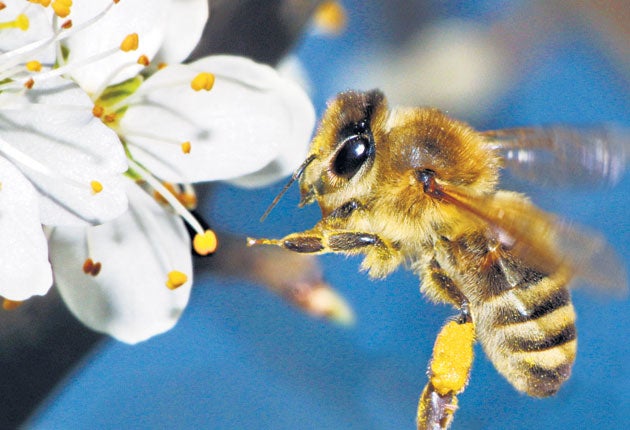Get busy and give a honeybee a home

Urban householders are being urged to consider keeping bees in their gardens, rooftops or even balconies to help protect declining honeybee populations.
Natural England, which is backing the launch of a new easy-to-use design of beehive, also wants people to support wild bee species such as bumblebees by planting insect-friendly plants in their gardens.
The Government conservation agency's chief scientist Tom Tew said gardeners should go out into their local area and see which plants the bees liked and then plant those in their flowerbeds.
He also said more people keeping and caring for honeybees would create more populations, making the insects more resilient to attacks from disease and pests which threaten their survival.
The first newly-designed 'beehaus' is going on the roof of Natural England's central London offices, and Dr Tew said the bees would be foraging in nearby areas such as St James' Park and Buckingham Palace gardens.
The bees fly high - around 5 metres above the ground - and would not be coming into contact with people on the city's pavements, he added.
He said: "We are happy to support anything that brings people in closer touch with the natural environment and helps the natural environment.
"There's no reason why our towns and cities should exist as wildlife deserts - wildlife can thrive when we design our urban areas with nature in mind and the 'beehaus' is a great example of how easy it is for anyone to bring the natural world closer to their doorstep."
Bees also provided an important service pollinating plants and crops, he said, and "we need to recognise that if we want plants to flourish we need healthy populations of insects to sustain them".
He said the more populations of honeybees "scattered around" there were, the more able they would be to cope with outbreaks of disease.
He also encouraged people to support other species of bee by installing bumblebee nest boxes in their gardens, and planting insect-friendly species in their gardens.
Bees play an important role in agriculture, with the value of commercial crops that benefit from bee pollination estimated at £100 million to £200 million a year. Honey is worth some £10 million to £30 million.
But bee populations face a growing number of threats including pests and diseases such as the varroa mite and a lack of habitat providing food sources such as wild flowers.
The number of honeybees has fallen by 10 per cent-15 per cent in the past two years, according to the Government.
There are some 250 species of bee in the UK, including 25 bumblebee species, and they are nearly all in decline.
The new beehive design by Omlet - makers of the Eglu urban chicken coop - aims to make it easier for people to keep bees in towns and cities, even if they do not have much space.
Its makers say the bees, which can forage up to three miles away from the site, will produce an average of 50 pots of honey from just an hour's attention a week in the summer.
Johannes Paul, of Omlet, said it was easy to keep bees in urban areas, and having a hive was a "low maintenance hobby which is really fascinating".
"Those in the know have been keeping bees in towns for a long time. Keeping a hive doesn't take much space, so you can even keep them on balconies, roof tops and obviously gardens."
The losses in honeybee colonies have led to a rash of "bee rustling" with hives stolen from commercial farms, but Mr Paul said amateur beekeepers keeping their hives in gardens or rooftops were unlikely to be the victims of theft.
Natural England urged anyone interested in keeping bees to consider the commitment it involves before taking the plunge, and then to get professional advice or visit their local beekeeping association for support and to see what was involved.
Join our commenting forum
Join thought-provoking conversations, follow other Independent readers and see their replies
0Comments